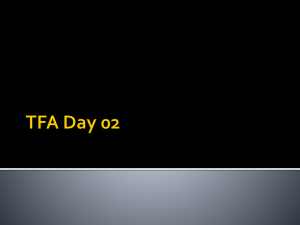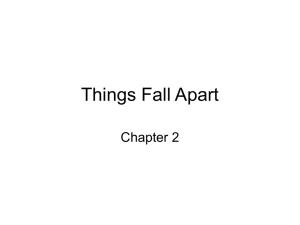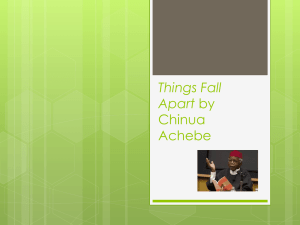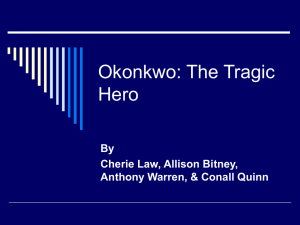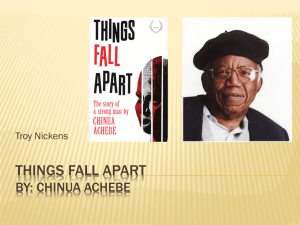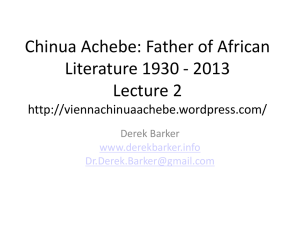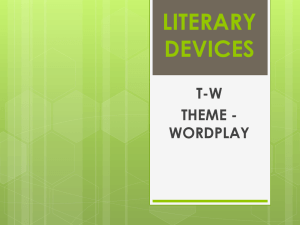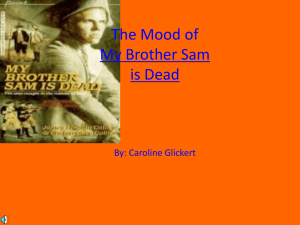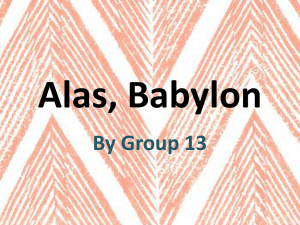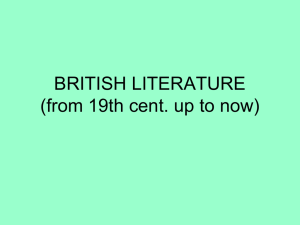Things Fall Apart Chinua Achebe
advertisement
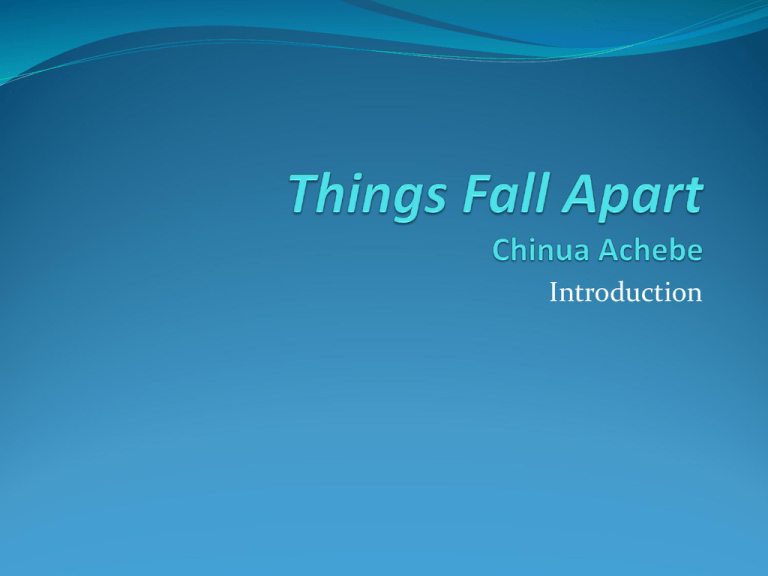
Introduction Background Often thought of as the first African Novel First published in 1958 (while Nigeria was still a British colony) Nigeria obtained independence in 1960 Set around nine fictional villages on the Niger delta (now modern day Nigeria) during the 1890s What do you know about Nigeria? Geography History/culture Society Literature Most populous country in Africa Rich history of human habitation and indigenous culture, but colonised by the British at the end of the 19th Century Modern Nigeria comprises of many different people-borders drawn up by Britain took no account of local alliances and rivalries. Famous writers- in English- Chinua Achebe and Wole Soyinka Key point Things Fall Apart portrays a stable and highly ritualised society at the time that it comes into contact with the imperial power of Britain. Think about the title and discuss whether you think this will be a constructive or destructive meeting. First Impressions The lines of verse at the beginning are from a famous poem called The Second Coming by W.B. Yeats. This is known as an epigraph. He believed that history moves in 2000 year cycles and the poem was written at the end of the horrors of WW 1 where, Yeats felt, that the end of 2000 years of Christianity was coming to a close. Turning and turning in the widening gyre The falcon cannot hear the falconer; Things fall apart; the centre cannot hold; Mere anarchy is loosed upon the world, The blood-dimmed tide is loosed, and everywhere The ceremony of innocence is drowned; The best lack all conviction, while the worst Are full of passionate intensity. Surely some revelation is at hand; Surely the Second Coming is at hand. The Second Coming! Hardly are those words out When a vast image out of Spiritus Mundi Troubles my sight: a waste of desert sand; A shape with lion body and the head of a man, A gaze blank and pitiless as the sun, Is moving its slow thighs, while all about it Wind shadows of the indignant desert birds. The darkness drops again but now I know That twenty centuries of stony sleep Were vexed to nightmare by a rocking cradle, And what rough beast, its hour come round at last, Slouches towards Bethlehem to be born? What do you think Yeats was trying to say-what feeling do you get from the poem? Why do you think Achebe included this as the epigraph for his novel? Yeats wrote a bleak poem which showed his concern and worries about the future of civilisation Achebe used it as a way of foreshadowing the fragmentation and collapse of indigenous culture and civilisation It also serves to show that he is an educated and intelligent man. He wrote the book in 1958 when racism, paternalism and patronising attitudes to African people, by Europeans, were very common. Chapter 1 Read chapter 1 and make notes on characters, setting, possible theme, narrative viewpoint, source of conflict and language. What impression do you get of Okonkwo? What impression do you get of his father, Unokwa? How do we know what they are like? How would you describe the society? What is the setting like? Identify suitable quotations and analyse them From whose viewpoint is the story told? Okonkwo- the protagonist- strong, powerful, proud, aggressive, inarticulate- a man of action not words: “whenever he was angry and could not get the words out quickly enough, he would use his fists.” (p 4) “he was already one of the greatest men of his time.” (p 7) Unoka Lazy, weak, drunkard, talented musician- seeks pleasure: “Unoka, the grown-up, was a failure.” Conflict Conflict seems to be between Okonkwo and his father, Unoka, however they are symbols of two different aspects of the society. Okonkwo can be said to represent action and the physical world, while Unoka can be said to represent thought music and art etc. Other types of conflict becomes more developed as the novel progresses. The “ill-fated lad was called Ikemefuna” introduced at the end of the chapter. Society Close knit, ritualistic, stories- use of parables frequent throughout the novel, democratic “Age was respected among his people, but achievement was revered. As the elders said, if a child washed his hands he could eat with kings.” (p 7) Setting Rural, ‘primitive’, elemental- a people in touch with their physical surroundings “ Some years the hartmattan was very severe and a dense haze hung on the atmosphere.” (p 4) NPOV- Third person omniscient narrator - author/story teller has access to all characters’ thoughts and emotional states. There is also a strong oral element to the narration where the narrator digresses with small parables and moves back and forth in time- it is not a linear narrative Chapters 2-4 Read through these chapters and make notes on: Language; character development; setting; plot Chapters 2-4 Simple language- sentence construction ‘And this was the message’ (p 8) reinforces the strong oral, matter-of-fact, narration style- use of the conjunction at start of statement reinforces this Character development Okonkwo- famous/heroic – ‘the greatest wrestler in the land’ (p25): shows society values physical prowess- protagonist is a ‘wealthy man’ Village is strong and wealthy Complexity of character- ‘They dared not complain’ shows he is an intimidating charactersees women as being weak: society is structured as a very tight hierarchy with the man at the top Okonkwo The fatal flaw- fear of failure- “His whole life was dominated by fear, the fear of failure and of weakness” (P 12) shows contradictory nature of his character: his strength is built on fear and weakness- paradox. Hamartia( fatal flaw)in literature the flaw in a character which leads to the downfall of the protagonist in a tragedy. Character development Okonkwo can be seen as a tragic hero. The tragic hero is a man of noble stature. He is not an ordinary man, but a man with outstanding quality and greatness about him. His own destruction is for a greater cause or principle. What evidence do we have of his greatness? As you read this novel bare this in mind- he is an inversion of a Shakespearean tragic hero: he is an ordinary man (not royal) with outstanding qualities, and his fatal flaw will bring about his downfall. Setting- elemental feel and sense that the people respect the world around them (also fearful of it they are in awe)- ‘darkness held a vague terror for these people’ ‘a vibrant silence made more intense by the universal trill of a million million forest insects’ poetic/lyrical image. Silence as an entity something with a physical presence, oxymoron‘vibrant silence’ and repetition to emphasise how rich the landscape is- evokes the sounds well Okonkwo Heroic qualities- ‘He was a man of action, a man of war. Unlike his father he could stand the look of blood’ –key quotation reader told directly by narrator what his character is like. We are also told how he is not like his father- implied that fear of perceived weakness, like his father, is his motivation “You have a manly and proud heart”- male qualities are emphasised again and again Unoka- “His love of talk had grown with age and sickness” end chapter 3- Okonkwo rejects everything his father is. Contrast between father and son Chapter 5 Man of action Village as collective entity with its own spirit- simile : “It was like the pulsation of its heart” marcus.roskilly@jamesgillespies.edin.sch.uk Chapter 6 Animism- The belief in the existence of individual spirits that inhabit natural objects and phenomena. For example, trees, rocks, rivers and other inanimate objects. Can you find a quotation at the start of chapter 6 which shows that Okonkwo’s society is an animistic one? Symbolism Symbolism- where a physical object represents something else(often an idea) The drums- symbolic of the spirit of the society. They represent the beating heart of the community and are a recurring motif throughout the novel. “In the distance the drums continued to beat” (33) “They were possessed by the spirits of the drums” The drums can also be seen as an extended metaphor “Spirits of good children lived in that tree waiting to be born.” In this society there is a powerful belief that people, animals, the land all possess souls which are connected and there is movement of souls (spirits) between these Identities change depending on the context. People are not always the same-p 43 Chpt 6 Can you find an extended metaphor which communicates the mood of the crowd?- metaphor of the drum communicates tension and excitement. “The air, which had been stretched taut with excitement, relaxed again” (35) Chapter 7- key chapter Evidence of the prominent role of men in this society? But also evidence that women play a highly significant role? For Tuesday 23rd September marcus.roskilly@jamesgillespies.edin.sch.uk Prominent role of men Nwoye- “nothing pleased Nwoye more...to do one of those difficult and masculine tasks in the home” he would “feign annoyance and grumble aloud about women and their troubles.” (38). This shows that Nwoye has moved up the patriarchal hierarchy but pretends (feigns) to be irritated by their minor demands. Okonkwo was very happy as he wanted a “tough young man” who was “able to control his women-folk” (30). Women portrayed as possessions through use of possessive pronoun. Use of the simile, in the form of a small parable: “He was like the man...his foo-foo.” Reinforces traditions and strong oral story telling tone of the novel and the society it depicts. “Nwoye knew that it was right to be masculine and to be violent.” (39) Tone of this sentence shows that there is no argument: this is best way to be! Wives serve Okonkwo Women However, women have the power and wisdom of the home. Series of parables with intelligent messages on how to be wise and knowledgeable (39) These are juxtaposed with Okonkwo’s macho stories Symbolism What is symbolism?- a physical object which represents something else (often an abstract idea) Can you identify a feature in this chapter which may be read as a symbol? What is it and what do you think it may mean? Why may this be seen as a key scene/turning point? Think about the closing action in the chapter. Locusts- seen as something to be celebrated at first. Introduced by a short dramatic sentence: “And then the locusts came.” (39)This gives it prominence in the narrative and marks this motif as a significant development. but signs that they are a harbinger of disaster (foreshadowing)“a shadow fell on the world, and the sun was hidden behind a thick cloud” (40). Obvious connotations of shadows- something to be feared is hidden. White man- missionaries “At first a fairly small swarm came”(40) Why do you think this is a key chapter? What is the crucial development (turning point) and why is it significant for Okonkwo as a ‘tragic hero’ Betrayal of Ikemefuna (more of a son to him than his real son) because of his fatal flaw. Fear of being seen as feeble. Identify key quotations (41- 44) “Do not bear a hand in his death”(41)-given advice from respected elder. “he was not afraid now. Okonkwo walked behind him” (43)Ikemefuna has complete faith and trust in Okonkwo “Okonkwo drew his matchet and cut him down. He was afraid of being thought weak.” (44) This is the ultimate betrayal, to kill your surrogate son, brought about by his fatal flaw. It is an important turning point as he has gone against the moral code of his society and has now lost the trust of his real son. Character analysis Read the start of chapter eight. How does Okonkwo feel and give a quotation with an explanation to back this up. Chapters eight and nine Read and make a note on plot and character development What do we learn about Ezinma? What is she like as a character? What do we learn about Okonkwo? How does Obierika contrast with Okonkwo? What are the main developments in plot? Complete for Tuesday 30th September Obierika is a much more measured and thoughtful character; in many ways he is the antithesis of Okonkwo (49)foreshadowing and allegory Okonkwo is again characterised as “not a man of thought but action” (50), however he is also shown to be considerate and sensitive to the merit of others, especially Ezinima. He uses an effective metaphor to describe her that compares her, favourably, with his sons: “Where are the young suckers that will grow when the old banana tree dies? If Ezinima had been a boy I would have been happier.” (48) Important The first mention of the white man- treated as a joke by the villagers and almost mythical creatures. Nobody has really seen them or had much to do with them. They are compared to lepers who obviously have significant connotations of unpleasantness as leprosy is a disease. (54) Egwugwu- a village elder who impersonates ancestral spirits: shows that identity is dictated by particular contexts. At the top of the social structure- “No woman ever asked questions about the most powerful and the most secret cult in the clan”(65) We can infer that Okwonkwo is one of the Egwugwu Play the role of judges- their word is final- shows us that this is a complex society Chapter 11 Main developments- relationship between characters: their willingness to go against tradition and ritual show the power of the bonds of love Setting- very powerful evocation of the primordial and rural nature of the setting Exemplary use of language to create a dark and forbidding tone- ‘trudged along between two fears’ (78)dilemma she is torn between fear of the surroundings and the priestess (multiple roles and identities) Chapters 9, 10, 11 Compare the notes you have made with a partner. Did you pick up on anything that they did not find? Add to your own notes and discuss main developments in terms of character, plot, setting and theme Chapters 12 and 13 Read chapter 12 What evidence is there that Okonkwo has deeper feelings than he reveals? Evidence that the men are ‘gossipy’ ? Evidence that this is a comlex and ritualised society? Chapter 12 quotations “He had felt very anxious but did not show it” - hides his emotions and empathy with his wife/daughter as to reveal it would be a sign of weakness “village that is known for being close-fisted” (p102) Dialogue on p 86 is highly stylised-it follows a well established pattern (like the endless ‘toasts’ at Western weddings). Festive and happy atmosphere which contrasts with following chapter. Chapter 13 What sign-from the start of the chapter- is there that something dreadful is going to happen in this chapter? What do the drums add to the mood? Identify a quotation which shows that Obierika is different from Okonkwo in the way he relates to his world. What literary term would you use to describe this chapter? Death of Ezeudu who warned Okonkwo- ‘bear no hand in his death’ (88)foreshadowing Drums build up atmosphere/mood – ‘The drums…reached fever heat’ (90)the drums appear to have agency they are driving events symbolise the collective heart of the clan build up to a frenzy and cataclysmic climax- Okonkwo’s killing of the boy. Explosion then ‘All was silent’-bold sentence “Obierika was a man who thought about things.” (91) Shows he is not ruled by passion, like Okonkwo, but considers law and society in a more measured way. It is the climax to part one and also the another turning point as the fate of Okonkwo and the whole society changes. Key chapter The death of the respected elder creates a tense mood, further developed by the drums. Okonkwo’s killing of the boy leads to his exile (for seven years) from his village. This is significant as it occurs at the end of part one so represents the end of an era. Structure is really important here. Review of part 1 Make a spider gram of main events from part 1 This should record characterisation, setting, themes, symbols, plot, language, key terms(reference to structure, key chapter(s), turning point(s) etc Note down key quotations with context and basic analysis Okonkwo’s fatal flaw is fear of failure, but also ambition- key quotation- “His life had been ruled by a great passion- to become one of the lords of the clan” (p115) Key chapters(turning points) Chapter 7- where Okonkwo kills Ikemefuna because of his fatal flaw (fear of being perceived as weak). “Okonkwo drew his machete and cut him down. He was afraid of being thought weak.” This leads to a change in his fate and to his tragic downfall. Locusts(symbol) use of foreshadowing the plague of the white colonisers Chapter 13- where Okonkwo accidently kills the son of Ezeudu which leads to his exile. It is the climax of part one and brings the relatively happy and prosperous period of Okonkwo and the village to a close. Critical Essay You will have one and a half hours to write two Critical Essays based upon two different texts that you have studied over the year. These must be from two different genres Key aspects that you should cover The relevance of your essays to the questions you have chosen, and the extent to which you sustain an appropriate line of thought Your knowledge and understanding of key elements, central concerns and significant details of the chosen texts, supported by detailed and relevant evidence Your understanding, as appropriate to the questions chosen, of how relevant aspects of structure/style/language contribute to the meaning/effect/impact of the chosen texts, supported by detailed and relevant evidence Your evaluation, as appropriate to the questions chosen, of the effectiveness of the chosen texts, supported by detailed and relevant evidence The quality of your written expression and the technical accuracy of your writing Practice question Look at the selection of questions from the past paper and select a question that is appropriate for ‘Things Fall Apart’ 2. Identify the key words and phrases in the question 3. Make a plan of your critical response(this should include quotations, techniques and sections of the novel you want to write about) 4. Write an introductory paragraph. Use the words of the question to help you with this. 1. Introductions need…? Title and author Reference to question Brief personal response (Synopsis of text although this should go in a separate second paragraph) Main Body The bulk of your essay will show an ability to understand , analyse and evaluate the text (novel, poem, play) that you are writing about. Remember that this needs to be shaped by the demands of the actual question that you are responding to. Do you remember the acronym that help you to do this? SQUAT Statement- topic sentence indicating what the paragraph will be about. You should identify the key technique(s) that you will be exploring. Quotation- evidence. Introduce your quotation properly. Understanding- explain the meaning(context) Analysis- explain the effect of the technique and quotation. This is the bulk of your paragraph. Task- refer back to the question Try to give two quotes and two substantive pieces of analysis in each Main Body paragraph. S(QUA)x2T Worked example S: Achebe uses direct characterisation and sentence structure to exemplify Okonkwo’s fatal flaw. Q- The author states: “ He was afraid of being thought weak.” U- This is written after Okonkwo murders his surrogate son, Ikemefuna, despite Ikemefuna trusting him. A- A short sentence is used to increase the impact, and emphasise the importance ,of Okonkwo’s actions. Ikemefuna ran to Okonkwo as he is attacked by the men of the village and Okonkwo’s brutal actions are dictated by his fatal flaw, fear of being perceived an unmanly man. This is important as it marks a significant turning point in the novel: from this point Okonkwo’s fate is fixed and he is doomed to follow a disastrous course of action that will lead to his tragic downfall, and the downfall of the entire society that he personifies. Furthermore, Achebe uses direct characterisation to inform the reader that this is the case as we are told in a strong 3rd person narrative voice. T- something about betrayal... Conclusion What makes a good conclusion? Summarise your main points(brief) Reference to the question A developed personal response Preparation for timed Critical Essay Look over your notes and start refining them. You should be thinking about key quotations and techniques that would be useful for any possible question. For this essay, you can have a page of notes. Obviously this will not be the case in the exam! Choose a novel in which a character makes a decision which you consider unexpected or unwise or unworthy. Explain the circumstances surrounding the decision and discuss its importance to your understanding of character and theme in the novel as a whole. Model introduction ‘Things Fall Apart’ by Chinua Achebe is a novel where the protagonist, Okonkwo, makes a decision that is both unwise and unworthy of his status. He decides to murder his surrogate son, Ikemefuna, because the village council has declared that he must die; despite the fact that he is told by wise men of the village not to be involved in the killing of him. This act changes his fate. His foolish and brutal act of betrayal is driven by Okonkwo’s fatal flaw: the fear of being perceived as weak and is crucial in our understanding of his character. It is also central to the central themes of ambition and fear of being perceived as weak. This essay will explore how the fate of the tragic hero, Okonkwo hero, Okonkwo, mirrors the decline and fall of the wider society he lives in. Feedback on Critical Essay Be specific about technique used in each paragraph of main body. For example, The author uses a strong omniscient 3rd person narrative point of view to give insight to Okonkwo’s character. Brief synopsis Develop analysis Watch expression Avoid the word quote Make sure you strike a formal tone (avoid “I”, contractions etc.) assertions Textual Analysis preparation Go over answers to ‘The Railway Man’. This will help you to develop fuller answers for your Textual Analysis NAB 2. Getting inside the minds of an SQA examiner! Formulating TA questions based on ‘Things Fall Apart’ 3. Practice NAB. One hour, under exam conditions, to complete an official TA NAB 1. Deeper analysis Write three Textual Analysis questions, based upon chapter 14 with answers, for your partner to answer Use the terminology that you would expect to see in an actual NAB For example: “Read page 95. How does the writer use imagery to develop setting?” 1. Read the last paragraph on page 95– “At Last the rain came” -- Comment and explain how the writer’s word choice contributes to the tone of this section 2. Read page 96– from “Okonkwo and his family worked very hard”: How does the writer use sentence structure to show Okonkwo’s feelings? 3. Comment on the impact of the final sentence. “Sand felt like live coals”. Tone- hard, bleak and barren contrasts with joyous release of the rains. The setting is awe inspiring and sublime. The feeling of the ground is compared to the feeling of burning items. The author uses strong imagery (simile) to emphasise how barren, dry and parched the ground was, underlining how hot the touch of it was to their feet. 2. “Then everything had been broken.” A short blunt sentence, shows that Okonkwo’s world had fallen apart and he feels bereft, depressed etc. Possible hyperbole. 3. Short sentence contained within a single paragraph emphasises the finality of the message. Connotations of a judge passing sentence on Okonkwo’s foolishness. 1. Feedback on TA (novel) Check formula for ‘Link Questions’ Expression/phrase is main part of a sentence, not the whole sentence Read the question properly “specific examples with comments”– give a quotation and explain its effectiveness Homework Read and make notes on chapters 14, 15 and 16 for Tuesday 11th November Article work for Wednesday 12th Part 2 Chapter 14 How does the author use pathetic fallacy to set the scene? Find a good quotation which emphasises Okonkwo’s fatal flaw? What does chi mean? Evidence that this is a patriarchal society, but the female is also revered? “At last the rain came” symbolises renewal, rebirth and hope “His life had been ruled by a great passion.” – shows that he is driven by one goal (ambition) and never thinks of consequences. Chi - personal god ( a bit like Karma) Patriarchal- “a child belongs to the father” “We are only his mother’s kinsmen” put themselves in a lower position Strength of female- “mother is supreme” Chapter 15 Make notes on Okonkwo’s characterisation-paying particular attention to ‘fatal flaw’ Plot development Thematic concerns Introduction of the white man- indicates disaster. The Oracle states, “the strange man would break their clan and spread destruction among them” (101) links to title. “They were locusts” (102) direct link to previous symbol Story (importance of oral culture) of massacre at Abame.-”Their clan is now completely empty” (102) “There is no story that is not true” (103) Okonkwo- is in exile a position of weakness, all he can do is watch. He is frustrated –the man of action“They were fools” ( 103) Chpt 16 Plot developments missionaries spreading new religion Dismissed by the high ranking- attracts only misfits: efulefu Oknonkwo’s son, Nwoye, joins them –why? Task Read to the end of section 2 and make notes on plot, tone, characterisation, language, setting. Pay particular attention to the end of this section. What do you think is going to happen? Extension task – Why do you think Nwoye joined the Christians and why do you think that Okonkwo would never do this? Refer to specific evidence in the text to back up your evaluation. Quotations “ converts the excrement of the clan, and the new faith was a mad dog that had come to eat it up”(105) compelling image: metaphor and example of use of parables “He is not my father”(105) Nwoye: a crucial denouncement of Okonkwo and his power. They represent (personify) the shift of power in society “my buttocks” use of humour to emphasise how new faith and its adherents seen as a joke, not a threat. “hymn…like the drops of frozen rain…” (107) lyrical use of language shows how the new religion speaks to the sensitive Nwoye Chapter 17 Plot developments Characterisation Theme- the old ways are beginning to ‘fall apart’ and the new religion is gaining converts this is symbolised by the conflict between Okonkwo and Nwoye “ Answer me…before I kill you” “The centre cannot hold” (Yeats) Okonkwo, in many ways is at the centre of the community Symbolism – Okonkwo as all consuming force- “Roaring Flame” Loss of his son, Nwoye, foreshadows loss of the old ways “like the prospect of annihilation” Chapter 18 Plot- church growing stronger (despite expectations). Tension between old and new- admission of osu (outcasts) too much for some- “we are all children of God” Osu are zealots “killing the sacred python” Characterisation-Okonkwo continues to demand action- “I take a stick and break his head” feels anger at inaction of the community- “ground his teeth in disgust”(140) “The clan saw no reason then for molesting the Christians” after death of Okoli clan feels, wrongly, that Gods are enacting revenge/retribution Section 2: notes Sense of urgency- pace of the narrative picks up. Symbolism- Nwoye rejects father (youth rejects old ways/religion)-loss of son a personal tragedy: family is at the heart of the clan and Okonkwo’s life. New church seen as conquering death- triumph over the evil forest-(significant as Christians claim to have conquered death) in retrospect a mistake to give them opportunity to ‘prove’ this Killing of the snake- murder of the old gods- feeds into Christian imagery: snake as temptation and the apple of knwoledge Prophecy/foreshadowing at the end sets up the tragedy (private and public) Symbolism SYMBOLS · The novel is highly symbolic. Two of the main symbols are the locusts and fire. The locusts symbolize the white colonists descending upon the Africans, seeming to augur good but actually portending troublesome encounters. Fire epitomises Okonkwo’s nature—he is fierce and destructive. A third symbol, the drums, represents the physical connection of the community of clansmen in Umuofia, and acts as a metaphorical heartbeat that beats in unison, uniting all the village members. MAJOR CONFLICT · On one level, the conflict is between the traditional society of Umuofia and the new customs brought by the whites, which are in turn adopted by many of the villagers. Okonkwo also struggles to be as different from his deceased father as possible. He believes his father to have been weak, effeminate, lazy, and poor. Consequently, Okonkwo strives to be strong, masculine, industrious, respected, and wealthy. Okonkwo and Nwoye too Tragic hero Okonkwo- the protagonist- is an inversion of the classic Shakespearean hero. He is not of noble birth (as Shakespearean tragic heroes are) he is of low birth,(as is Eddie in View) but he does have heroic qualities- generous, honourable, physically/mentally strong. He does have fatal flow- ambition and fear of appearing weak- which will lead to his downfall. Useful to compare him with Hamlet who was noble but his fatal flow was inaction and indecision, again an inversion of Okonkwo Review of part 2 Make a mind map detailing the main developments of part 2. You should show how: characters develop and change Detail plot developments Link these to themes (fatal flaw, ambition, colonialism) Colonialism: the policy or practice of acquiring full or partial political control over another country, occupying it with settlers, and exploiting it economically. Give key quotations and techniques: explain significance Part 3 Discuss and make notes on the main developments in this section. Think about Tragedy Ambition Difference between Mr Brown and Mr Smith (why these names?) Colonisation/conflict Theme Chapter 20 What technique is used in the opening to show how Okonkwo’s life (society too) has changed? What allegory (simile) is used in the 1st paragraph? Quote and explain its significance. What is the tragedy of his first son? (125) Do you think he is exploiting his daughters for his own ambition? Explain. Find a key quotation to show that colonialism is growing stronger. How does Okonkwo show his dismay (technique)? Part 3 – key quotations Colonisation- “But apart from the church, the white men had also brought a government” (127) classic pattern of colonisation where religion softens the people up which is followed by a colonial government. The native people lose control of their own country/destiny “He has put a knife on the things that held us together and we have fallen apart”- mournful metaphor with clear reference to the title Mr Brown personifies soft power “he trod softly on its faith” (aware of cultural sensitivities) Mr Smith is more brutal: does not care about native sensibilities- “black was evil” (metaphor) Arguably, two sides of the same coin. 25 Tragedy underlined by Oknokwo’s mode of death: hanging. He knows it is a “abomination” and “offence against the Earth” (151), yet he commits suicide. He had no choice because things have fallen apart. He is driven to this by his fatal flaw. In the final chapter Achebe uses a deeply ironic tone to represent the commissioner's thoughts- Okonkwo’s life has been reduced to nothing more than a footnote in the colonist’s history books “a reasonable paragraph”. The whole novel poetically told the story of a complex and noble society. Leading to this tragic end that was inevitable for Okonkwo and the wider community. People’s lives have ‘fallen apart’. Shift in emphasis evident in final chapter: the “natives” have become bystanders in their own story. The Commissioner's view is given prominence in the final chapter. Structure Really important in the novel: Part 1: life before colonisation –magical and majestic tone full of allegories (long) Part 2: Exile – growth of colonisers’ power (short), faster pace Part 3: the final act– death and demise (short) tragic. Critical Essay practice You are going to be given different questions from past papers and work on developing a critical response to an appropriate question You should: Identify key words in the question Write an introduction Plan the rest of the essay: three Topic Sentences with appropriate evidence and notes on analysis Conclusion
